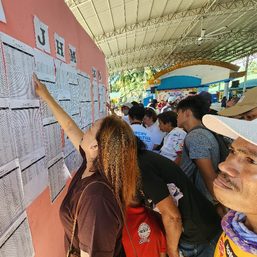SUMMARY
This is AI generated summarization, which may have errors. For context, always refer to the full article.

MANILA, Philippines – In the upcoming 2023 Barangay and Sangguniang Kabataan elections (BSKE), thousands of candidates find themselves running without opposition.
For the role of barangay chairman, 7,226 candidates nationwide face no contenders, the Commission on Elections (Comelec) data showed. Most of them are in the Bangsamoro Autonomous Region in Muslim Mindanao (BARMM), Eastern Visayas, Western Visayas, and Calabarzon.
Comelec data also revealed that 1,611 candidates for barangay councilor positions are unopposed.
In the SK polls, 8,057 chairpersons have no opposing candidates, while 10,620 youth council member positions are uncontested. Most of them are also from the BARMM.
But does running unopposed guarantee an automatic victory?
According to the Comelec law department “a simple plurality of votes or at least one vote” is needed for a lone candidate to win.
Vacant seats
Aside from unopposed candidates, numerous barangays may have vacant elective positions due to a lack of candidates filing certificates of candidacy.
Based on Comelec's data, eight villages do not have a candidate running for the position of barangay chairman. Eight of these villages are located in the BARMM, one in the Zamboanga Peninsula, and another in Central Visayas.
Additionally, there are 124 barangays where no candidates have filed for the position of SK chairperson, and 543 where no candidate has filed for the role of SK member.
What happens in the absence of candidates?
Despite the absence of candidates for some barangay posts, Comelec spokesperson John Rex Laudiangco said that the election would proceed.
Following the election, in accordance with the Local Government Code, the mayor will declare a permanent vacancy in those posts.
In cases where there are no candidates for barangay chairperson or SK chairperson, there are two options: the Department of the Interior and Local Government, through the mayor, may appoint a "caretaker" or follow the rule of succession.
Under the rule of succession in Chapter 2, Section 44, of the Local Government Code, the barangay kagawad or SK member with the highest number of votes will assume the role of barangay chairperson or SK chairperson, respectively. The vacated seat of the barangay kagawad will be filled through an appointment made by the mayor.
Another option to address vacant SK positions is to hold a special election, according to Laudiangco.
He said that the Comelec had considered a special election in 2018, but had concerns about funding and uncertainty regarding candidate participation.
Laudiangco also noted that individuals appointed by the mayor must meet the qualifications required for the positions they are appointed to, ensuring that capable and qualified individuals are selected to fill these crucial roles in local governance. – Rappler.com
1 comment
How does this make you feel?
![[OPINION] Tough times call for ‘flexible’ governance](https://www.rappler.com/tachyon/2023/11/Tough-times-call-for-flexible-governance.jpg?resize=257%2C257&crop=264px%2C0px%2C720px%2C720px)
![[OPINION] Political terrain in Taguig has shifted](https://www.rappler.com/tachyon/2023/11/binay-cayetano-taguig-november-22-2023.jpg?resize=257%2C257&crop_strategy=attention)





![[Be The Good] Freedom from ignorance, apathy](https://www.rappler.com/tachyon/2024/06/be-the-good-carousel.png?resize=257%2C257&crop=461px%2C0px%2C1080px%2C1080px)

This is both a surprising and sad information. Can/will anyone analyze the causes and implications of these results from a political, economic or sociological perspective or any combination of these three? Lastly, what is so special with BARMM that it really stood out?